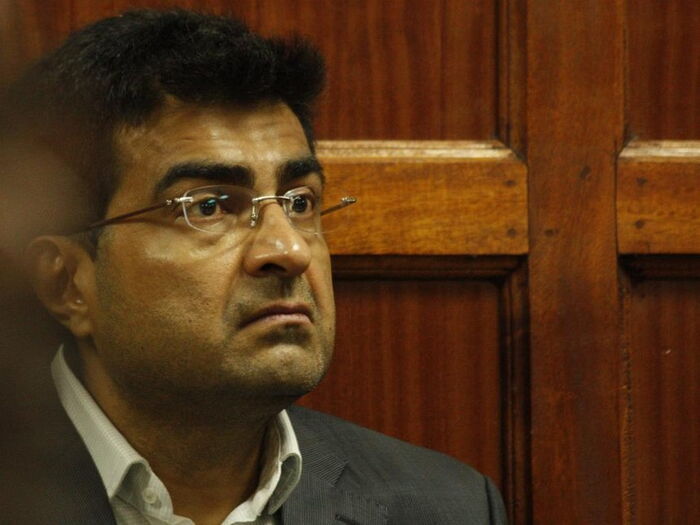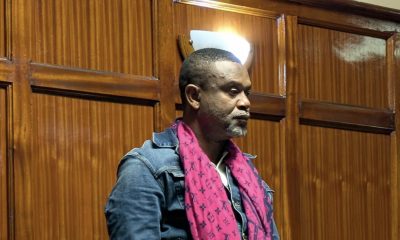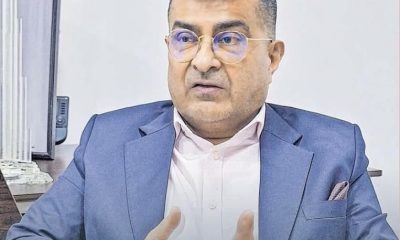Africa
Controversial Gold Baron Kamlesh Pattni Secures Major Refinery Deal With Niger
Pattni first gained international notoriety in the 1990s as the mastermind behind Kenya’s Goldenberg scandal, widely considered the largest financial fraud in the country’s history.

In a move raising eyebrows across international financial crime monitoring circles, Kamlesh Pattni, the notorious architect of Kenya’s Goldenberg scandal and subject of recent gold smuggling investigations, has secured a major deal with Niger’s military government to establish a gold refinery in the West African nation.
The agreement, signed Wednesday at Niamey’s House of Uranium, establishes a joint venture between Niger and Pattni’s Dubai-based Suvarna Royal Gold Trading LLC to create “Royal Gold Niger SA.”
The company will be responsible for installing a gold refinery, jewelry manufacturing facility, and precious stone processing center in Niger.
“It is a structural revolution because, from now on, Niger’s gold will no longer only be extracted, it will be transformed here, for the benefit of the Nigerien people,” said Niger’s Minister of Mines, Commissioner-Colonel Abarchi Ousmane, during the signing ceremony attended by other government officials.
A Controversial Figure Returns to the Spotlight
The deal marks a remarkable comeback for Pattni, who has been at the center of multiple gold-related scandals across Africa for decades.
Most recently, he was implicated in a 2023 Al Jazeera investigative documentary titled “Gold Mafia,” which exposed elaborate gold smuggling operations in Zimbabwe.
The Al Jazeera investigation revealed how Pattni and other gold traders allegedly used their connections to launder money and smuggle gold out of Zimbabwe, circumventing international sanctions and depriving the country of much-needed revenue.
Following the exposé, Pattni reportedly faced sanctions from several international financial monitoring bodies.
The Goldenberg Scandal: Kenya’s Largest Financial Fraud
Pattni first gained international notoriety in the 1990s as the mastermind behind Kenya’s Goldenberg scandal, widely considered the largest financial fraud in the country’s history. The grand theft nearly sunk the country’s economy.
As a young businessman in his twenties, Pattni established Goldenberg International, which received government subsidies for supposedly exporting gold and diamonds from Kenya to foreign markets.
Investigations later revealed that most of these exports never existed.
The scheme cost Kenyan taxpayers an estimated $600 million to $1 billion—approximately 10% of the country’s annual GDP at the time.
Despite facing numerous charges, Pattni managed to avoid significant jail time through a combination of legal maneuvers, settlements, and political connections.
Zimbabwe’s “Gold Mafia” and Recent Controversies
The 2023 Al Jazeera investigation showed Pattni had not abandoned his gold trading activities. The documentary series revealed his alleged involvement in Zimbabwe’s gold smuggling networks, where he reportedly worked with political elites to move gold out of the country illegally.
According to the investigations, Pattni’s operations in Zimbabwe allegedly involved converting smuggled gold into cash to circumvent international banking restrictions and sanctions imposed on Zimbabwe.
“Pattni has demonstrated a remarkable ability to reinvent himself across different African countries whenever his operations come under scrutiny in one jurisdiction,” said a Nairobi-based financial crimes analyst. “His business model typically involves cultivating high-level political connections and exploiting regulatory weaknesses in the gold supply chain.”
Niger’s Gold Ambitions Under Military Rule

Pattni Inks deal with Niger military government. The ceremony took place at the Uranium House, in the presence of the Minister of Mines, Commissioner-Colonel Abarchi Ousmane, the Minister of Budget, Mamane Sidi and the CEO of Suvarna, Pattni Kamlesh Mansukhal Damji, who initialed the documents.
Niger’s decision to partner with such a controversial figure comes as the country’s military government, which took power in a July 2023 coup, seeks to gain greater control over its natural resources and reduce foreign influence.
The agreement aligns with statements from Niger’s ruling National Council for the Safeguarding of the Fatherland (CNSP) about enhancing sovereignty over mineral resources.
Minister Ousmane emphasized this nationalist vision during the signing ceremony: “This partnership is part of the strategic vision of our mining policy, devoted to the enhancement of the mining chain.”
Niger has significant untapped gold reserves, with artisanal mining having been a source of livelihood for many communities since the 1950s.
The country’s military rulers appear eager to formalize and industrialize this sector, potentially as a way to generate revenue amid international sanctions imposed after the coup.
Concerns from Financial Crime Monitors
The involvement of Pattni, with his history of gold-related scandals, raises questions about transparency and regulatory oversight.
“When individuals with a track record of involvement in illicit gold trading gain access to newly formalized supply chains, there’s significant risk of corruption and continued illicit activities,” said a representative from Global Witness, an international NGO that investigates natural resource exploitation and corruption speaking to Al Jazeera.
International financial intelligence units have previously flagged Pattni’s operations for potential money laundering risks.
Following the Al Jazeera exposé, several banking institutions reportedly severed ties with companies associated with him.
The Dubai Connection
Pattni’s company, Suvarna Royal Gold Trading LLC, is based in Dubai, United Arab Emirates—a global hub for gold trading that has faced criticism for lax regulations regarding the origin of gold imports.
A 2020 report by the Financial Action Task Force (FATF) highlighted vulnerabilities in the UAE’s gold market that could enable money laundering and illicit gold trading.
The country has since implemented reforms, but critics argue implementation remains inconsistent.
According to trade analysts, establishing refineries in gold-producing African countries while maintaining connections to Dubai-based trading houses creates opportunities to control both the supply and distribution channels of gold.
What’s Next for Niger and Pattni?
At the signing ceremony, Mr. Pattni expressed satisfaction with the partnership terms, saying it “is part of the vision of the Nigerien authorities.”
The Niger government claims the joint venture will generate local employment, increase tax revenues, and help combat illicit gold trading networks.
However, governance experts question whether adequate safeguards are in place to prevent potential abuse.
As Niger moves forward with this controversial partnership, international financial monitoring bodies will likely scrutinize the operations of Royal Gold Niger SA closely.
The success or failure of this venture may have significant implications for Niger’s mining sector and for Pattni’s continued operations across Africa.
Kenya Insights allows guest blogging, if you want to be published on Kenya’s most authoritative and accurate blog, have an expose, news TIPS, story angles, human interest stories, drop us an email on [email protected] or via Telegram
-

 Grapevine1 week ago
Grapevine1 week agoRussian Man’s Secret Sex Recordings Ignite Fury as Questions Mount Over Consent and Easy Pick-Ups in Nairobi
-

 News5 days ago
News5 days agoTHE FIRM IN THE DOCK: How Kaplan and Stratton Became the Most Scrutinised Law Firm in Kenya
-

 Investigations1 week ago
Investigations1 week agoMulti-Million Dollar Fraud: Three Kenyans Face US Extradition in Massive Cybercrime Conspiracy
-

 Economy6 days ago
Economy6 days agoIran Demands Arrest, Prosecution Of Kenya’s Cup of Joe Director Director Over Sh2.6 Billion Tea Fraud
-

 Business7 days ago
Business7 days agoA Farm in Kenya’s Rift Valley Ignites a National Reckoning With Israeli Investment
-

 Africa1 week ago
Africa1 week agoFBI Investigates Congresswoman Ilhan Omar’s Husband’s Sh3.8 Billion Businesses in Kenya, Somalia and Dubai
-

 Business2 weeks ago
Business2 weeks agoM-Gas Pursues Carbon Credit Billions as Koko Networks Wreckage Exposes Market’s Dark Underbelly
-

 Arts & Culture1 week ago
Arts & Culture1 week agoWhen Lent and Ramadan Meet: Christians and Muslims Start Their Fasting Season Together




























